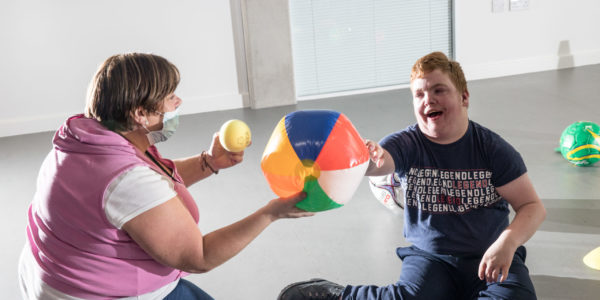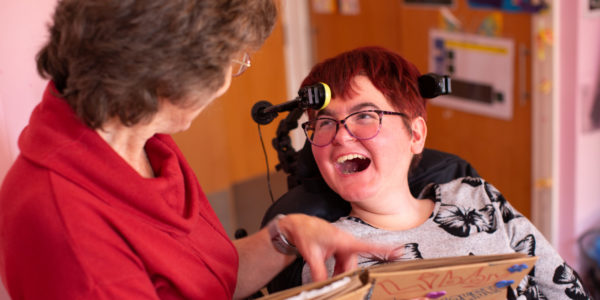Respite care (short breaks for carers)
Respite care – sometimes called “short breaks” – is a term used to describe opportunities to take a break from caring.
Respite breaks for carers can take many different forms.
Find out more on this page about what respite care can look like, how to arrange it and how it can affect benefits.
On this page:
Get support from Sense
We support people with complex disabilities and their families and carers all over the UK.
- What is respite care?
- How to get respite care
- How to get respite care for a child
- How long can respite care last?
- Will a temporary break in caring affect my Carer’s Allowance?
- Sense services
What is respite care?
Respite care is a way of describing services that give you a break from caring.
This could be in the form of:
- Day services.
- Community support.
- A temporary carer who steps in for you.
- The person you care for takes a short trip to visit friends/family or stay in a residential home.
- The person you care for goes on a supported holiday or short break.
Note, “respite care” is a phrase usually used to mean care for adults, not children. This page is mostly about how to arrange respite care for disabled adults – see more information on short breaks for disabled children.
How to get respite care
How to arrange respite care depends on where you live, and how you pay for it.
You might choose to fund respite care, such as a short stay in a residential home, yourself.
In some areas, you might be offered some respite care from your local authority after your carer’s assessment. This might be fully or partly funded.
You might also be able to access fully or partly funded respite care via charities or local organisations.
Who pays for respite care?
Your local authority
Depending on where you live, you might be offered respite care from your local authority as the result of either a carer’s assessment or a needs assessment.
As well as these assessments, the council should also carry out a financial assessment, to work out how much you can afford to pay towards the support you need.
If the financial assessment shows that you can’t afford to cover the costs yourself, you should be offered help from the council.
You might be offered help in the form of fully or partially funded respite care.
You might be offered support in the form of a personal budget, which can be paid as direct payments. If this is the case, you can use the money to arrange respite care for yourself.
Find out more about personal budgets and direct payments.
Paying for your own respite care
If the council finds that you can afford to pay for respite care, then you may have to fund it yourself.
Remember, even if you don’t think you will qualify for financial support, you should still ask for a carer’s assessment and/or needs assessment.
Your local authority will still offer guidance on local support that’s suitable for you.
Charitable sources
You may be able to get free respite care, or money towards the cost of respite care, from a charitable organisation.
Find out more about charitable grants for disabled people.
See respite care options from Sense.
How to get respite care for a child
The process of getting respite care for disabled children is slightly different than for adults.
Find your Local Offer
Your local authority must publish information about all the services and support available to children with special educational needs and disabilities in your area.
This is called the Local Offer.
The Local Offer should include information about short breaks services for disabled children.
You can find a Local Offer by searching for ‘SEND’ or ‘Local Offer’ on a local authority website or by searching for the area name and ‘Local Offer’ on Google.
Get a needs assessment for your child
If you think you need social care services, you can ask your council for a needs assessment for your child.
You should do this by contacting your local authority’s department for children with disabilities.
Your child doesn’t need to have a medical diagnosis for you to ask for a needs assessment.
You are entitled to a needs assessment if your child is a “child in need”.
This means that they:
- Can’t achieve or maintain a certain level of health or development, or their health and development will suffer, if they don’t get help from the local authority.
- Have a disability (as defined by the Equality Act 2010).
Find out more from Contact about asking for a needs assessment for a disabled child.
How long can respite care last?
Respite care can last for anything from a few hours to a few weeks.
It depends on the kind of care you arrange. You might organise for a carer to come and take over from you for you for a day, or you might arrange for the person you care for to go on a week-long holiday.
There are some rules about how long respite care can last if you receive Carer’s Allowance.
Will a temporary break in caring affect my Carer’s Allowance?
You can take short breaks from caring without impacting your Carer’s Allowance.
In general, you can take up to four weeks off in a six month period. But the rules are quite complicated. It’s best to speak to the government’s Carer’s Allowance Unit for advice.
You must tell the Department for Work and Pensions if the person you care for will be in respite care for more than 12 weeks.
Find out more about Carer’s Allowance.
Sense short breaks and respite services
Sense is here for people with complex disabilities and for their families and carers, too.
Our services give carers a break from caring, while also giving people with complex disabilities the opportunity to build confidence, make friends and express themselves.
We also offer services for siblings, young carers, parents and families around the UK. Check out some of our services below, or speak to our information and advice service to find out more about how we could support you.
Get support from Sense
We support people with complex disabilities and their families and carers all over the UK.
This content was last reviewed in July 2023. We’ll review it again next year.







